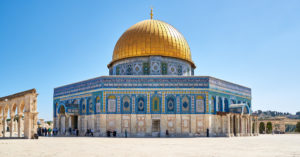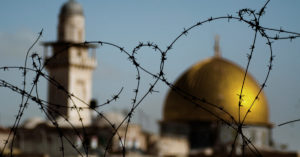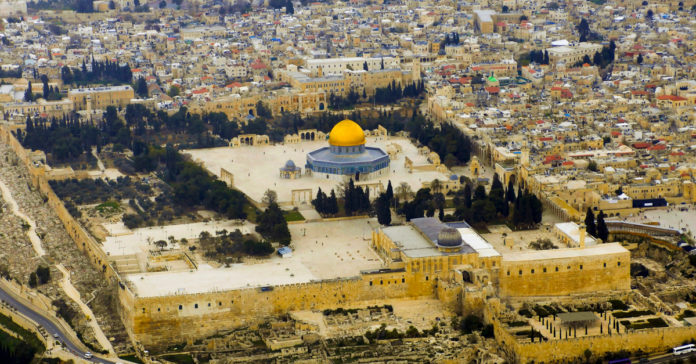Shaykh Ali Hammuda, Tarbiyah Editor at Islam21c, has written a khutba for Al-Aqsa which he hopes can be used by imams and khatībs when delivering their Jumuah Khutbahs tomorrow.
Despite spending the last ten years of his life in a city over 800 miles away from Jerusalem, the Prophet Muhammad (sall Allāhu ‘alayhi wa sallam) would nevertheless frequently make a point of including Al-Aqsa in his speech. He knew its status in the Eyes of Allāh, and he knew that the events of the end of times will culminate on its soil. The Companion Abū Dharr once asked the Prophet (sall Allāhu ‘alayhi wa sallam):
“O Messenger of Allāh, which mosque was built on Earth first?” He said, “Al-Masjid al- Ḥarām (in Mecca).” I said, “Then which [mosque]?” He said, “Al-Masjid al-Aqsa.” I said, “How much time was there between them?” He said, “Forty years.”
Al-Aqsa is therefore no ordinary mosque, and Palestine is no ordinary land. It served as a venue for the greatest conference to have ever taken place on Earth, one that was attended by every Prophet to have walked the globe, and when the greatest of them —Prophet Muhammad (sall Allāhu ‘alayhi wa sallam) — was made to lead them all in prayer.
Ibn Abbās mentions: “Bait al-Maqdis was built by the Prophets and inhabited by the Prophets. There is not the area of a single hand span except that a Prophet prayed in it or an angel stood on it.”
Al-Masjid al-Aqsa was the first qibla of the Prophet (sall Allāhu ‘alayhi wa sallam) and his Companions, and remained so for around 14 and a half years before it was then changed to the Ka’bah. So distinct was this venue that when the Prophet (sall Allāhu ‘alayhi wa sallam) received his invitation to visit the inhabitants of the heavens, Allāh chose Palestine for his ascension, in order to create within the hearts of Muslims the unbreakable link between Mecca and Palestine.
“Glory be to Him who took His slave on a journey by night from al-Masjid al-Ḥarām to al- Masjid al-Aqsa, whose surroundings We have blessed, in order to show him some of Our Signs. He is the All-Hearing, the All-Seeing.”
Subscribe to our newsletter and stay updated on the latest news and updates from around the Muslim world!
The Prophet (sall Allāhu ‘alayhi wa sallam) said: “Do not undertake a journey to visit any mosque but three: this mosque of mine, the Mosque of al-Ḥarām, and the Mosque of Aqsa.”
Zionist oppression
This Ramaḍān, the Israeli occupiers have taken their boldness and vulgarity to new levels. Horrific scenes unfolded of armed Zionist troops launching an assault on worshippers — including women, children, and the elderly — turning the masjid into a full-fledged war zone. The occupiers besieged those in i‘tikāf, hundreds of whom were left to bleed without medical attention.
How relevant are the words of Allāh:
“Who are more unjust than those who prevent the name of Allāh from being mentioned in His mosques and strive toward their destruction? It is not for them to enter them except in fear. For them in this world is disgrace, and they will have in the Hereafter a great punishment.”
Al-Ṭabarī prefers the opinion that the specific connection to this verse is in relation to Al- Masjid al-Aqsa.
Meanwhile, outside the masjid, the Zionist occupiers — neither content with the stolen land “bestowed” upon them by the UN, nor with the stolen land occupied by them in violation of the UN since 1967 — raided Palestinian homes and sought to evict tens of families from the Sheikh Jarrah neighbourhood, named after a personal physician to Saladin, in East Jerusalem. They threw people out of their own homes, usurping them with impunity, as their own security forces watched them doing so in order to “preserve Jerusalem’s Jewish identity.”
A message to the key players
In light of the above, I wish to share a few messages with the key players in this conflict. First of all, a message to the Jerusalemites on the frontlines in Al-Aqsa:
You are the salt of the earth. Your resilience resembles the robust trees standing at the Damascus Gate to the Old City, as you defend on our behalf, bare-chested, with your heads high and hearts certain of Allāh’s promise. After Allāh, you are our inspiration whenever our motivation falters, and you are our motivation when despair takes hold. Indeed, the Ramaḍān TV shows of 2021 are so many, but nothing compares to your confrontation of the occupying forces, charging us with vibes that no show could ever achieve, as we strain our thoughts: “How can I involve myself in this colossal cause?”
No doubt, you are the consciousness of our Ummah, one which our Prophet Muhammad (sall Allāhu ‘alayhi wa sallam) promised that the agencies of repression can never defeat. If this is the gallantry of the third generation of Muslim Jerusalemites, then truly, your enemies have no hope. We wish we had been the soil beneath your feet, for those who live amongst you live honourably, and those who die do so as martyrs whose good deeds are made to forever grow from within their graves.
A message to scholars and Imams:
We call upon you to make al-Aqsa central to your concerns, and not merely as part of a short- term remembrance during a plight. A longer-term strategy is the obligation of the hour. Include al-Aqsa when teaching ‘aqīda (theology), history, etc., featuring it regularly in your sermons, and including it in your modules and curricula. Your position is an amānah (trust). Your congregation expects such guidance, and the securer of your wage is Allāh, not a committee. The same can be said to social media influencers and community activists: use your platforms to mobilise the Muslims in defence of al-Aqsa, each according to their capacity, resources, and sphere of influence.

The celebrated Kurd whom we know today as Ṣalāḥ al-Dīn was not parachuted from the heavens, but was the product of Imams who understood their duties towards the Islamic cause of Palestine. These Imams understood what their positions entailed and nurtured Ṣalāḥ al-Dīn to look beyond his nationality and the sinful aspirations of the youth, and to see al-Aqsa as central to his being.
Consider how Jewish wedding ceremonies end with the stomping on glass to serve as a reminder, even during the height of personal joy, of their pain and loss of the alleged Temple in Jerusalem. Consider the Western wall of the Al-Aqsa compound, known to the Jews as the Wailing Wall, the holiest site for Jewish prayer, where visitors mourn and bemoan the destruction of the Temple. We ask our Imams: for the last, say, ten years, how many times has this topic appeared in your addresses?
We also call upon congregations to respectfully encourage their Imams to fulfil this duty.
A message to the general Muslim masses:
Make Al-Aqsa your number one priority visit. Visit Al-Aqsa in groups of families and friends. Inhale from its pure air, prostrate on its blessed land, and supplicate to Allāh on its holy sanctuary for its aid. Reading about the Islamic cause of Palestine is one thing, but only a visit in person can illustrate the full extent of what has happened over the decades.
Find a recommended travel agent that offers a full programme, then book your trip. I stand baffled at those of us who have toured every holiday destination, preferring to return home with souvenirs, debts, and a tan over the everlasting deeds offered at al-Aqsa. Such prizes include what the Prophet (sall Allāhu ‘alayhi wa sallam) promised, when he said:
“When Prophet Sulaimān, the son of Dāwūd, finished building Bait Al-Maqdis, he asked Allāh for three things: judgement that was in harmony with His judgement, and he was given that. And he asked Allāh for a kingdom that no one after him would have, and he was given that. And when he finished building the Masjid (of Al-Aqsa), he asked Allāh that every person who comes to it intending only to pray there that he emerges free of sin as the day his mother bore him.”
In another narration, the Prophet (sall Allāhu ‘alayhi wa sallam) added: “As for two of his requests, Sulaimān was granted them. My hope is that he was granted the third.”
Be proactive, create solutions.
Our history as Muslims is witness to the countless calamities that Allāh averted through suggestions that were put forward by ordinary people. Al-Ḥubāb b. al-Mundhir did not like the site which the Prophet (sall Allāhu ‘alayhi wa sallam) had chosen to camp in before the battle of Badr. He politely asked: “O Messenger of Allāh, this place that you have chosen, is it from Allāh such that we should not comment on it? Or is it part of strategy of war?” The Prophet (sall Allāhu ‘alayhi wa sallam) told him that it was the latter, and so al-Ḥubāb made a suggestion: to advance and camp at the nearest well to the enemy so that the Muslims could collect water in containers for themselves, then fill the remaining wells with sand so the enemy would have no water. He did just that.
By all means, act upon the suggestions of signing petitions, lobbying MPs, boycotts, divestments, and attending demonstrations. However, you have your own ideas too. Whilst there is always scope for “tell me what I can do for al-Aqsa,” feel empowered to say: “Let me tell you what we can do for Al-Aqsa.” Claim the cause as your own.
Consider the following:
- We lack literature for children regarding the issue of al-Aqsa and its plight. What can we do about that?
- Few of our scholars are addressing the Judeo-Christian myths surrounding al-Aqsa. How can these myths be addressed innovatively?
- Political interaction for al-Aqsa is increasing, but what about our local councils, many of whom have contracts with Israeli businesses or support Israeli settlements? How can this be addressed?
- Thousands of NGOs exist in support of settler groups. What ways can our existing NGOs, like Friends of Al-Aqsa, be further empowered, and even replicated?
- Unlike Zionist charity work, most of our charity work for Al-Aqsa is reactive. What ways can we make it proactive?
- What can wealthy businessmen do by way of awqāf for the cause of Al-Aqsa?
- Social media platforms like Instagram are deleting accounts and censoring stories relating to Al-Aqsa’s plight. What alternative strategies can we devise to raise awareness and concern?
Think out of the box, voice your opinions, and take the lead on the cause.
Promote optimism
In the last couple of days — and against all the odds — we have witnessed an astonishing series of retreats by the Zionists.
Last week was scheduled to have the Israeli High Court rule in favour of evicting the families of Sheikh Jarrah. Fearing a further escalation, however, Israel has bowed to pressure and has delayed the forced eviction of Palestinian families from their homes in occupied East Jerusalem.
Zionist extremists were congregating to storm the al-Aqsa compound in their racist display of a “unified Jerusalem.” The defiance of hundreds of Palestinians sent the nationalists home.
The subsequent aggressive raids, along with the siege of Al-Aqsa Mosque, was for the purpose of forcefully dispersing the Muslims and re-facilitating the Jewish march. However, despite being under fire and attacked with tear and stun grenades, the Jerusalemites persisted in their i‘tikāf, resulting in a full cancellation of the march.

In recent years, the Israeli authorities had installed metal detectors at the entrance to the Mount. The Jerusalem Islamic Waqf called on Muslims to pray outside the Temple Mount and not enter the mosque complex until the metal detectors were removed. They were subsequently removed.
Undoubtedly, the battle is by no means over, and Israel will continue its plotting for a full Aqsa and Jerusalem takeover. But take a moment to recognise the huge achievements to date, despite the sheer aggression of the occupier, the enormous disparity in means, and the collaboration of neighbouring and non-neighbouring Arab states. This bears proof that the smallest of endeavours can reap tremendous results, and proof that the Will of Allāh is above every will, and that He alone is the controller of affairs.
“Whenever they kindle the fire of war, Allāh puts it out.”
Furthermore, a full-fledged uprising has ignited all across historic Palestine; Jenin, Nazareth, Gaza, Lidda. Prayers for Al-Aqsa’s salvation are bellowing across the skies of Turkey, as the Turkish street demands greater intervention. Political and civil movements are taking place in Kuwait, Jordan, Sudan, Iran, Egypt, Mauritania, Lebanon, Yemen, Algeria, Sri Lanka, Indonesia, and even on the streets of New York, Washing, Norway, and other places. Meanwhile in the UK, at least 45,000 emails have been sent to MPs as a result of a British NGO to save Sheikh Jarrah. The unifying effects of Al-Aqsa’s wounds upon our fractured Ummah cannot be ignored or quantified.
َ“And Allāh has full control over His affairs, but most people do not know.”
What can I do for Al-Aqsa?
Whilst I do not doubt the sincere frustration of the utterer of such a statement, it does illustrate a frustration that may have obscured certain realities, one of which is the following: whilst du‘ā without action is futile, all actions without du‘ā are similarly just as futile. We are witness to the many times that the geography of lands was shifted, the permission of angelic descent granted, and history rewritten via the supplication of a single man or woman.
When the Muslim military general Qutayba b. Muslim looked into the enemy lines of the Turks and found himself in awe of their numbers and weaponry, he enquired about the famous worshipper Muḥammad b. Wāsi‘. He was told that he was on the right flank of the Muslim army carrying his bow, whilst pointing his finger into the heavens in du‘ā. Qutayba said:
“That finger of his is dearer to me than one hundred thousand unsheathed swords and strong youths.”
The deafening silence that follows from your heartfelt du‘ā does not mean that it was not heard by the heavens. Rather, end your du‘ā with unwavering conviction that your du‘ā is on its way to its destination. It will become a key player on the Al-Aqsa scene in the form of steadfastness in the hearts of the Jerusalemites, or weather conditions that favours them, or fear that is cast into the hearts of their enemies, or angelic descent, or circumstances that only Allāh knows of. Dedicate five minutes for this on a nightly basis.
Beware of haste. It is vital to note that the efforts you exert today may only come to fruition many years after your death. You are not more jealous for the Ummah’s causes than Allāh is, so do not despair if you do not see your efforts taking off during your lifetime. Your duty is to merely sow the seed with dedication, then it is up to Allāh to decide how and when to give life to matters.

‘Ali b. Ṭāhir al-Sulamī was a jurist of the Shāfi‘i school of thought, teaching in the Umayyad Mosque in Damascus. He authored a book called Kitāb Al-Jihād (The Book of Jihad). This book details the rulings of jihād, explains the Qur’anic verses that address it, and the duties of different categories of people. The book frequently cites al-Ghazāli. It was the first scholarly response to the Crusades, which had, by that time, conquered Jerusalem.
The initial public readings of this book were in the year 1105, six years after Jerusalem had been conquered by the Crusaders. One would assume that these readings would be popular due to the urgency of the matter, yet they were poorly attended, and the book was largely forgotten. A year after this, ‘Ali b. Ṭāhir passed away. He did not live to see much.
Fast forward 81 years to the blessed land of Shām. The night sky should be filled with tension, yet there is a surprising calm, and excitement fills the air. This time, thousands of Muslims have gathered in a hushed huddle to hear a reading of the book. The pin-drop silence is only broken by the weeping sounds of the sincere, or the bellows of the takbīr. Led by Salāḥuddīn and his teacher Nūr al-Dīn Zengi, a once disparate Muslim community of various ethnicities and languages became united by Islam and inspired into action by the book of ‘Ali b. Ṭāhir. It was read in the lead to the decisive battle of Hittin, the battle in which Jerusalem was liberated by Salāḥuddīn. One can imagine the reaction of ‘Ali b. Ṭāhir when, on the Day of Judgment, he is informed, God willing, that his book played a key role in the recapturing of Jerusalem.
In summary of the above, if we cannot do the small things we are asked to do, we are deluding ourselves if we feel that when the time comes, we will be able to sacrifice more.
Man may behave complacently towards an illness so long as it is clear of his heart. For example, take a smoker: the staining of his fingers may not frighten him, nor the damaging of his gums. In fact, even when some start coughing — a clear sign of respiratory damage — they may still continue smoking. It is only when news is broken to them that their heart is now under threat that a reaction is sparked, spurring them into immediate action.
Palestine and Al-Aqsa are the heart of this Ummah and a barometer of its health. From Allāh’s endless mercy upon us, He has decreed that our Ummah’s illness is at the centre of its heart, creating an unparalleled sense of urgency and fast-tracking our awakening that could not have been achieved otherwise.
This khutba was written by Shaykh Ali Hammuda, Tarbiyah Editor, Islam21c and was first published on Islam21c.




















